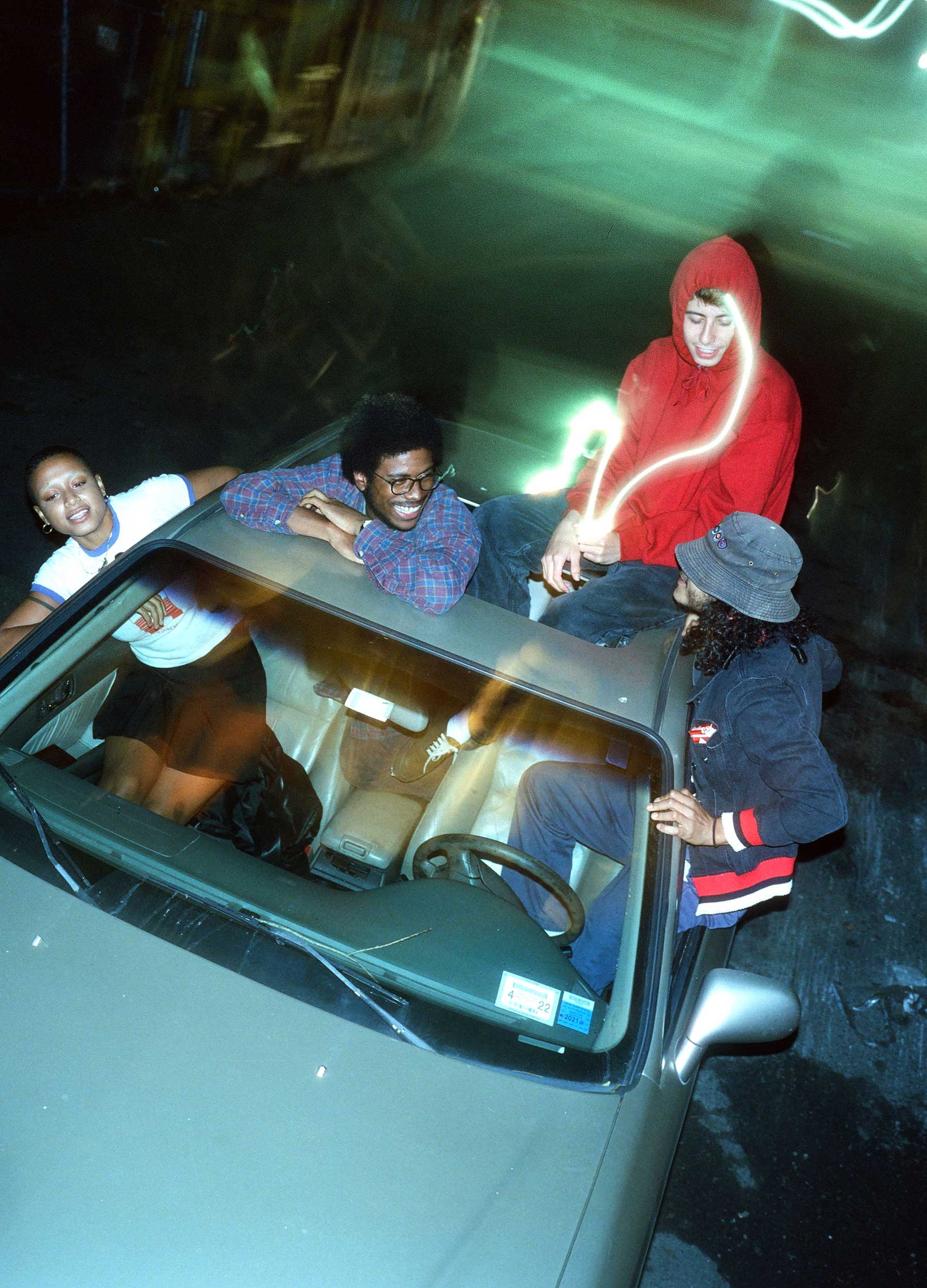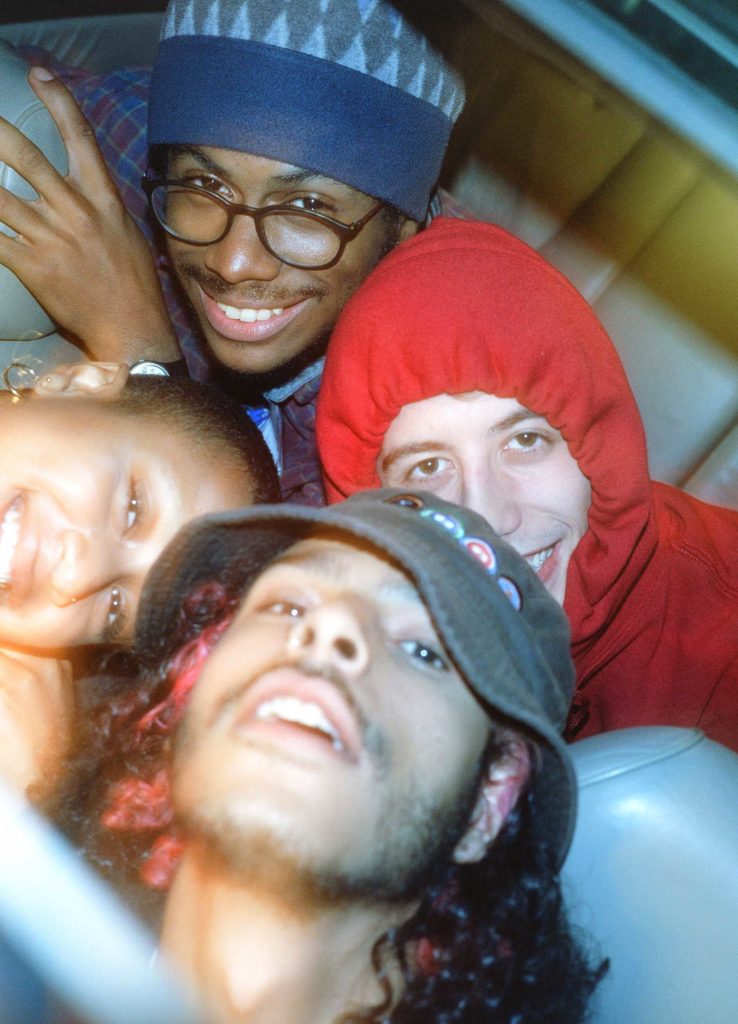
Issue 3 | Summer 2021
Feature
In The End, Blair Have Each Other
The New York-based rock group illustrate the kinds of real friendships forged in the pandemic
By: Samuel Hyland
Photography: Lauren Davis
There is a great deal of activity going on in the band Blair’s tiny Brooklyn rehearsal space. First, it’s the guitars spuming and erupting like lava at the core of a squalid underworld. Then, it’s the voices, wailing into microphones at maximum volume but still somehow overtaken by distorted riffage emanating from a set of mini-amps propped up against a wall. Bunched-up cables snake their ways to overdrive pedals scattered across the carpet.
Replacement guitar strings and Marlboro cigarette cases line a surface adjacent to the exit. The ceiling light is dim and yellow. Put together, it’s enough to guarantee that a first-time visitor trips over something at least once.
When I arrive, Paul “Paulie Boy” Zapata, a guitarist in the band, has to knock as hard as he can on the door to get us inside. All of the walls are sound-proofed, but you can still hear — and feel — the music from the hallway. Paul’s knocks go undetected. So, he extracts a card from his wallet with a sigh, pressing it against a sensor, cautiously making his way in so as not to bump a guitar out of someone’s hands.
In April of 2019, the group behind the door emerged with a self-titled EP featuring songs about friendship, loss, and existence. Their current lineup consists of Zapata, 27, from Long Island, Genesis Evans, 24, from Flatbush, Nico Chiat, 23, from Los Angeles, and Anysia Kym Batts, 26, from the Bronx.
Not too long before the band’s debut, Chiat and Evans connected with Simone – who had just come off of a breakup with his previous project – through a mutual friend, after which the trio began routinely visiting his New York studio to jam together.

It was out of these sessions that Blair haphazardly came to be. Following the 2019 departure of their original drummer, group acquaintance ML Hassan introduced the trio to Batts, who had previously spent time studying drums at Manhattan’s Collective School of Music.
Last year, they released a gritty single titled “Nothing Helps,” a vulnerable narrative exploring anxiety grown out of isolation. On this particular afternoon in September, they’re running through a rotation of songs that they’ve been working on for their newest project Tears to Grow, out as of February 2021. “I’m gonna fuck this up so bad,” Chiat says before they rehearse a track loosely titled “Promise.” It’s a sentiment that gets repeated throughout the rehearsal. Between songs, just as often as you’d hear speaker hum and brief microphone feedback, you hear personal mistakes being declared, proudly, like lotto numbers.
“We were all inexperienced with having a band,” Chiat says of Blair’s beginnings. “So we all had to do what we knew.”
Batts is quick to follow up. “We just learn and figure it out together.”
“If you were alone saying ‘I don’t know,’ you would feel so embarrassed,” Chiat adds. “But we’re all just like: ‘we don’t know.’”
The group’s candid approach to making music manifests itself in an honesty that is evident from the first listen. On “On and Off,” the closing track to their eponymous debut EP, dismal intrapersonal sentiments follow a minute-long Jerry Springer Show sample, the basis of which is a tearful woman lamenting at her unfaithful partner in a 2018 episode.
“I just wanna die,” Evans howls afterward, a whirlpool of blaring guitar chords and percussion blitzkrieg seeming to accentuate his anguish. Every word is delivered with the full intensity of what sealed-in torment is seldom released – there are ominous howls, agonizing squeals, and the omnipresent through-line of doubt for oneself. “Who is this in my head?” he asks in one line. “(I) Don’t think I got another tear to shed.”
In their sophomore release, a more mellow rhythm section sets the stage for similarly somber internal dialogue. Verses feature the track’s narrator questioning himself on a range of faults: an addiction to medication, a lack of creativity, and the inability to hold a conversation sit at the forefront. But in the chorus – backed by an instrumental shift from mournful to boisterous – all of these issues melt into a resolve that leaves no veil between hope and reality: “Nothing helps. I can’t help myself.”
Watching them, it becomes clear that their rhetoric of “not knowing” is one that naturally spills over into the process by which they create. The goal, of course, is to make music – but although there exists an unspoken tradition of band members sticking to their instruments, adherence is not a mandate: as long as the goal is reached, it doesn’t matter who plays what.
At an individual level, the members of Blair prioritize friendship. They are adamant about the fact that they find inspiration in each other. Over several months during lockdown, Paulie Boy underwent a tedious process of scouring countless digital trails to find his biological family in Colombia he’d never met. A few weeks before our interview, he finally reached them — and they’ve been in contact daily since.
“That was honestly beautiful when it happened,” Chiat says. “I feel like it even got me through feeling really sad during Covid. It was so nice to be there for that.”
Anysia nods. “Just, watching it happen, from meeting Paul, to him figuring out if this was something he wanted to make time to make happen… It happened so quickly — I don’t know what I’m comparing it to, but in terms of manifestation, that was such a blessing.”
It’s evident that Blair doesn’t need to make music to be a band. Whether in the studio or outside of it, they are a one-of-a-kind faction made up of equally one-of-a-kind individuals, all motivated to figure life out by each other’s sides.
“Really all I want to do is just love you all,” Paul concludes.
As I follow them out of their tiny Brooklyn rehearsal space and into the night, that is the sentiment that sticks with me. Blair may not come with context. Or diplomas in advanced music theory. Or a worldwide stan culture that gets them flanked by fans on the street. But Blair has each other.